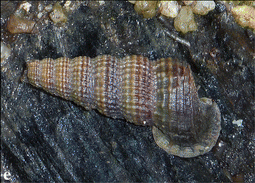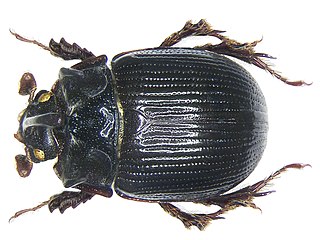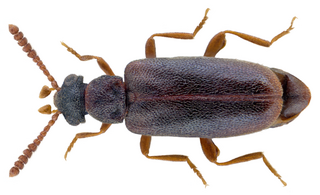
The Percidae are a family of ray-finned fish, part of the order Perciformes, which are found in fresh and brackish waters of the Northern Hemisphere. The majority are Nearctic, but there are also Palearctic species. The family contains more than 200 species in 11 genera. The perches and their relatives are in this family; well-known species include the walleye, sauger, ruffe, and three species of perch. However, small fish known as darters are also a part of this family.

Samuel Stehman Haldeman was an American naturalist and philologist. During a long and varied career he studied, published, and lectured on geology, conchology, entomology and philology. He once confided, "I never pursue one branch of science more than ten years, but lay it aside and go into new fields."

The Cerophytidae are a family of beetles belonging to Elateroidea. Larvae are associated with rotting wood, on which they are presumed to feed. The family contains over 20 species in five genera, primarily distributed in the New World, but also in Eurasia and Africa. 17 fossil species in 7 genera are known extending to the Early Jurassic. Like some other elateroids, the adults are capable of clicking.

The Megaspilidae are a small hymenopteran family with 13 genera in two subfamilies, and some 450 known species, with a great many species still undescribed. It is a poorly known group as a whole, though most are believed to be parasitoids, and a few hyperparasitoids. Many are found in the soil, and of these, a number are wingless.

Planorbidae, common name the ramshorn snails or ram's horn snails, is a family of air-breathing freshwater snails, aquatic pulmonate gastropod molluscs. Unlike most molluscs, the blood of ram's horn snails contains iron-based hemoglobin instead of copper-based hemocyanin. As a result, planorbids are able to breathe oxygen more efficiently than other molluscs. The presence of hemoglobin gives the body a reddish colour. This is especially apparent in albino animals.

Ataxia, described by Haldeman in 1847, is an American genus of longhorn beetles of the subfamily Lamiinae, tribe Pteropliini.

Endomychidae, or handsome fungus beetles, is a family of beetles with representatives found in all biogeographic realms. There are around 120 genera and 1300 species. The family was established based on the type genus Endomychus, a genus erected in 1795 by Panzer which was applied to a species that Linnaeus called Chrysomela coccinea. As the common name suggests, Endomychidae feed on fungi. Crowson, in his influential treatment of the beetles, placed the family within the Cucujoidea. They have a tarsal formal of 4-4-4 or 3-3-3 and the wings lack a closed radial cell. The second antennal segment has a sensory appendage that is as long as the third antennal segment. The family has also been grouped with the Coccinellidae in a group called the Trimera for having pseudotrimerous tarsi. A 2015 molecular phylogeny study found that the Cucujoidea were found to be non-monophyletic and the Endomychidae was refined with the removal of the Anamorphinae from within the family and elevated to the status of a full family, Anamorphidae. Mycetaeinae and Eupsilobiinae were also found not to belong within the clades of the core Endomychidae, and likewise reclassified into the families Mycetaeidae and Eupsilobiidae.

Cerithidea is a genus of medium-sized sea snails or mud snails, marine gastropod mollusks in the family Potamididae, the horn snails.

Odonteus is a genus of beetles in the family Bolboceratidae, formerly known by the name Bolboceras. The name Bolboceras was replaced in 1990 when it was discovered that Odonteus had been published one month earlier; this finding was upheld by ICZN Opinion 2138 in 2006, which made the two names synonymous, with Odonteus having priority. Some researchers continue to use the invalid junior name (e.g.).
Cerithideopsis is a genus of medium-sized sea snails or mud snails, marine gastropod mollusks in the family Potamididae, the horn snails.

Abdera is a genus of false darkling beetles, in the family Melandryidae. It contains three species, two of which are extinct and were discovered in 2014.
Abdera hoffeinsorum is an extinct species of false darkling beetle in the genus Abdera. It was discovered in Baltic amber in 2014.
Xylolaemus sakhnovi is an extinct species of cylindrical bark beetle in the family Zopheridae. The species is solely known from the Middle Eocene Baltic amber deposits in the Baltic Sea region of Europe. The genus Xylolaemus contains a total of six extant species distributed from western Europe through the Canary Islands and North Africa to India. The species is the first in the genus to be described from a fossil specimen.
Diapterna is a genus of aphodiine dung beetles in the family Scarabaeidae. There are about 6 described species in Diapterna.

Syzeton is a genus of ant-like leaf beetles in the family Aderidae. There are more than 10 described species in Syzeton.

Vanonus is a genus of ant-like leaf beetles in the family Aderidae. There are about 16 described species in Vanonus.

Allopoda is a genus of false flower beetles in the family Scraptiidae. There are at least three described species in Allopoda.

Canifa is a genus of false flower beetles in the family Scraptiidae. There are at least four described species in Canifa.

Cnopus is a genus of ant-like leaf beetles in the family Aderidae. There are at least four described species in Cnopus.
Ptiliola is a genus of beetles belonging to the family Ptiliidae.















